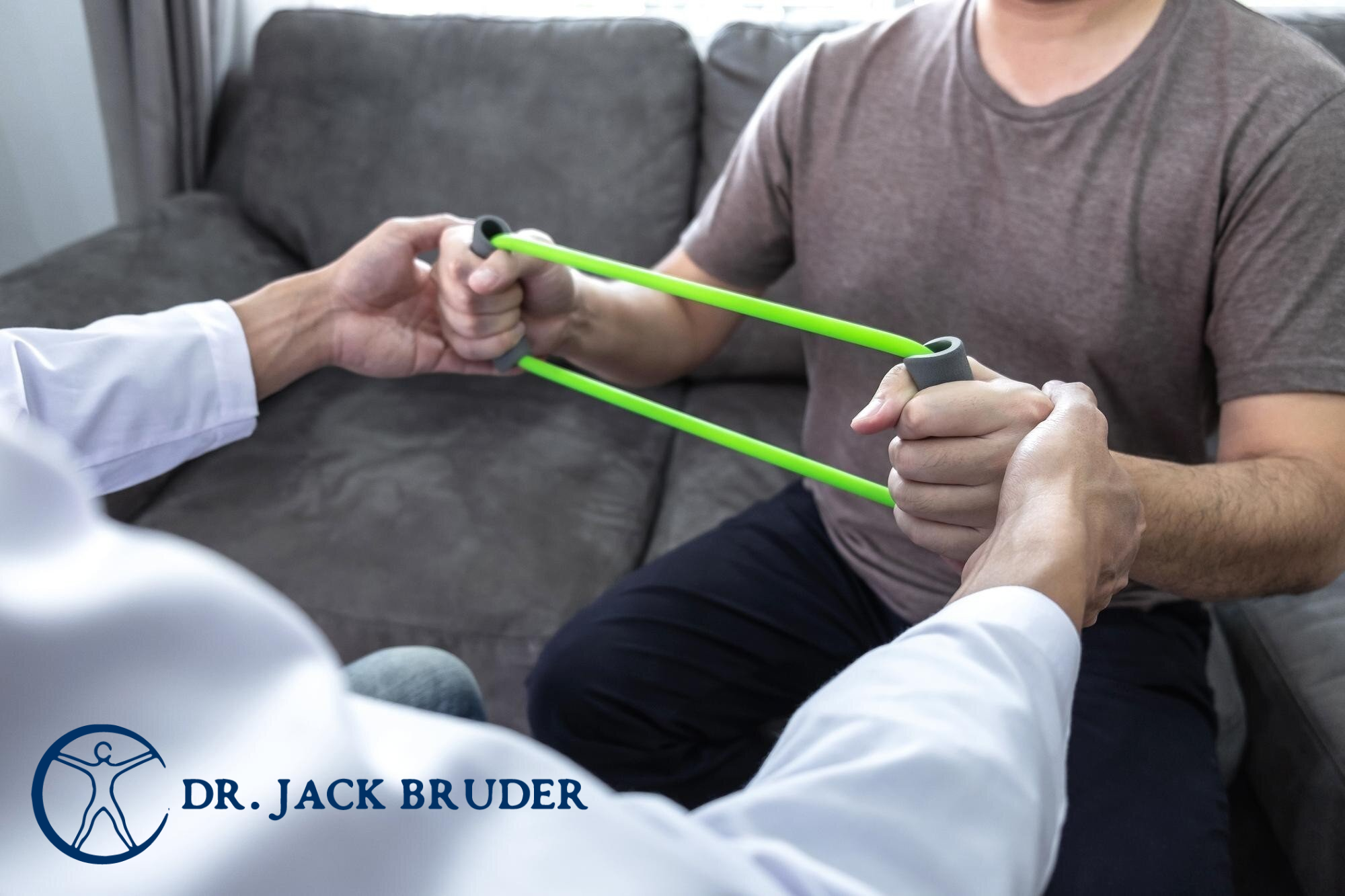Premature ejaculation is more common than many people think and more complex than it might appear. It’s a condition that affects men across all ages, backgrounds, and health profiles. As someone who specializes in male urology here in New York, I understand how overwhelming it can feel to seek help, especially when you’re unsure where to begin or have already tried other solutions without success.
For many of my patients, especially older men managing broader urology health issues, the most effective treatment is one that thoughtfully combines both evidence-based therapy and medication. This dual approach allows us to address the full picture not just the physical response, but the emotional, hormonal, and neurological components that often contribute to PE.
When patients come to me seeking help with premature ejaculation, my first goal is to create a safe, welcoming environment. You should never feel embarrassed or judged for discussing this concern. PE is a common and treatable medical condition not a reflection of your masculinity, character, or capability.
I’ve found that combining structured therapy with the appropriate medications allows us to deliver meaningful, lasting improvements. Whether the cause is rooted in anxiety, hormonal changes, prostate health, or a mix of factors, a personalized plan helps us treat the issue from every angle giving you back not just control, but confidence and peace of mind.
Why I Use a Dual Approach: Therapy + Medication
There’s no “magic pill” when it comes to treating premature ejaculation and that’s one of the most important truths I share with every patient. While medications can effectively reduce symptoms like hypersensitivity or rapid climax, they don’t always address the underlying factors that contribute to the condition. Conversely, therapy alonewhile essential for addressing emotional and psychological componentsmay not be sufficient when hormonal imbalances, nerve sensitivity, or prostate issues are also at play.
That’s why I use a dual approach that integrates both therapy and medication. This combined strategy allows us to:
- Relieve physical symptoms with evidence-based medications like SSRIs or topical anesthetics: To address the physiological aspects of premature ejaculation, I use proven medical treatments that directly target the body’s ejaculatory response. SSRIs help regulate serotonin levels in the brain, extending time to climax, while topical anesthetics reduce penile sensitivity to slow arousal. These options are carefully selected and monitored based on your individual health profile, ensuring safe, effective symptom relief as part of a broader, personalized care strategy.
- Target underlying psychological drivers such as performance anxiety, stress, or trauma through counseling and behavioral training: Emotional and mental health factors often play a significant role in premature ejaculation. Through personalized counseling and structured behavioral interventions, we address issues like performance anxiety, chronic stress, or unresolved past trauma that may be disrupting sexual response. This approach not only helps break the cycle of anticipatory fear and frustration, but also builds lasting emotional resilience and self-awareness key components in achieving long-term control and confidence.
- Adapt treatment as your needs evolve, ensuring you’re supported on every level physically, mentally, and emotionally: Your health journey isn’t static, and neither is your care. As your symptoms improve, your lifestyle shifts, or new concerns emerge, we adjust your treatment plan to match. Whether it means modifying medication, introducing new therapeutic strategies, or revisiting your goals, I ensure that every phase of your care remains aligned with your evolving needs so you feel consistently supported in body, mind, and relationships.
As a urology doctor Manhattan and a trusted urology doctor NYC, I’ve seen firsthand how pairing therapeutic support with medical intervention can lead to lasting improvements. It’s not just about treating a condition, it’s about restoring confidence, enhancing relationships, and improving overall health outcomes. This personalized, balanced method ensures that no aspect of your well-being is overlooked, and that your treatment works in real life not just on paper.

Medical Tools I Use to Treat PE
When it comes to medication, there’s no one-size-fits-all solution. That’s why I always begin with a thorough, personalized assessment to ensure we’re choosing the safest and most effective option for your unique physiology, medical background, and treatment goals. My priority is not just symptom relief, but long-term success with minimal side effects.
Some of the most common medications I use to treat premature ejaculation include:
Selective Serotonin Reuptake Inhibitors (SSRIs)
SSRIs such as sertraline or paroxetine are frequently prescribed at low doses to help delay ejaculation. These medications work by increasing serotonin levels in the brain, which helps regulate sexual response and extends time to climax. When used appropriately, SSRIs can be a powerful part of a comprehensive PE treatment plan, especially for men with coexisting anxiety or mood-related symptoms.
Topical Anesthetics
In cases where heightened penile sensitivity is a contributing factor, I may recommend the use of numbing creams or sprays. These topical anesthetics temporarily reduce nerve response, helping to prolong intercourse without the need for systemic medication. They’re especially helpful for men who experience PE despite having otherwise healthy sexual function.
Tramadol
For select patients, Tramadola prescription pain reliever that also impacts neurotransmitters can serve as an off-label treatment for PE. While effective for some, it must be used with caution. I always monitor this option closely to manage potential side effects and avoid dependence. It’s typically considered only when other first-line treatments have not delivered desired results.
The key to success with any of these treatments is customization. I tailor the dosage, frequency, and type of medication to suit your specific medical history, lifestyle, and response over time. No two patients are the same, and your care plan should reflect that. My goal is to provide relief that is not only effective but sustainable, safe, and aligned with your broader health and wellness goals.
Therapeutic Techniques That Complement Medication
Even the most effective pharmaceutical treatments can fall short if underlying psychological or behavioral patterns aren’t addressed. That’s where therapy plays a transformative role. In my experience, integrating therapeutic tools with medical intervention is what creates the most lasting, meaningful improvements for patients dealing with premature ejaculation.
These are some of the key therapeutic techniques I use in practice:
Behavioral Exercises
These methods focus on retraining your body’s sexual response and improving physical control over time:
- Stop-start technique: This structured behavioral exercise practiced either solo or with a partner is designed to help men recognize the stages of arousal and intentionally pause stimulation before reaching climax. By stopping sexual activity at key moments, allowing arousal to subside, and then resuming, the stop-start technique builds greater control, enhances body awareness, and improves ejaculatory timing. Over time, it trains the nervous system to regulate arousal more effectively, making it a foundational tool in treating premature ejaculation..
- Squeeze technique: This method involves applying firm pressure to specific areas of the penistypically just below the glans at the onset of climax to temporarily reduce arousal and delay ejaculation. When practiced consistently, the squeeze technique can help desensitize hypersensitive areas, enhance ejaculatory control, and build greater awareness of arousal patterns. It’s often most effective when combined with other behavioral strategies or used in a guided therapeutic setting
Cognitive Behavioral Therapy (CBT)
CBT is a powerful tool for exploring the mental patterns and beliefs that may be influencing your sexual response:
- We work to reframe unhelpful thoughts around performance, masculinity, or self-worth.
- CBT helps reduce anxiety, shame, and negative self-talk all of which can accelerate ejaculation or block progress.
Mindfulness Training
Stress and anxiety are among the most common psychological drivers of PE. Through mindfulness techniques, we cultivate body awareness and reduce overstimulation:
- Breathing exercises and meditation help quiet the mental “noise” that often fuels performance anxiety.
- These practices enhance present-moment focus, which is critical for improved control and enjoyment during intimacy.
Couples Therapy or Communication Coaching
In many cases, involving a partner can significantly improve outcomes:
- We work on building healthy communication around intimacy, expectations, and emotional needs.
- When both partners feel safe and supported, it fosters collaboration rather than pressure, often removing one of the biggest psychological barriers to progress.
How I Integrate Both Sides into a Unified Plan
When you come to me for help with premature ejaculation, we don’t just choose a single solution and hope it works. Real progress happens when treatment is comprehensive, designed to address not only the physical symptoms, but also the emotional and relational dimensions of your health. That’s why I use a unified, step-by-step approach that combines medical precision with therapeutic insight.
Here’s what that looks like in practice:
- Conduct a full medical and psychological assessment: We begin with a comprehensive evaluation to identify all the factors contributing to your symptoms, biological, hormonal, neurological, and emotional. This deep-dive approach ensures we’re not just addressing surface-level concerns but uncovering any underlying or overlapping issues such as erectile dysfunction, chronic stress, or prostate health changes. By understanding your full health picture, we can design a treatment plan that is not only accurate and effective, but truly tailored to your individual needs.
- Establish clear goals and expectations: From the start, we define what success looks like for you whether that means achieving longer-lasting intimacy, rebuilding self-confidence, or improving communication with your partner. Together, we set tangible, realistic benchmarks to measure your progress, so you always have a clear sense of direction. These goals guide every step of the treatment plan, helping us stay focused, motivated, and aligned with what matters most to you.
- Develop a phased treatment plan that evolves with your progress: Your care is never one-and-done, it’s a responsive process that grows with you. As your symptoms improve, lifestyle changes occur, or new goals emerge, we adapt your treatment accordingly. This may involve adjusting medication dosages, introducing additional behavioral strategies, refining therapy objectives, or reevaluating diagnostic insights. Each phase is intentionally structured to build on your progress, ensuring that your treatment remains effective, relevant, and aligned with your evolving needs.
- Schedule follow-ups to make ongoing adjustments: Regular check-ins are an essential part of your treatment journey. These scheduled follow-ups allow us to stay aligned, monitor progress, and make real-time adjustments based on how you’re responding. Whether it’s tweaking a dosage, refining a therapeutic technique, or revisiting your goals, these sessions ensure your care remains dynamic, personalized, and continuously optimized for long-term success.
This integrated care model allows me to treat the whole person, not just a single symptom. Whether you’re dealing with PE alone or alongside ED, we address both with intention and expertise. As an experienced erectile dysfunction doctor NYC, I often see these conditions present together and by treating them in tandem, we’re able to restore performance, improve confidence, and enhance long-term sexual wellness in a way that fragmented care simply can’t.
When PE Coexists with Other Urology Issues
For many men, PE isn’t the only concern. Hormonal imbalances, prostate inflammation, or erectile dysfunction can all play a role. That’s why I always assess for:
- Low testosterone
- Prostate enlargement or infection
- Pelvic floor dysfunction
As a board-certified erectile dysfunction doctor New York City and urologist, I specialize in recognizing these interconnected issues and treating them cohesively.
Evidence-Based Care That Builds Confidence
I rely heavily on the most recent research and clinical guidelines when creating treatment plans. Some of the resources I trust and often recommend to my patients include:
- National Institute of Diabetes and Digestive and Kidney Diseases (NIDDK) for insights on male reproductive and hormonal health
- CDC Men’s Health for preventive care information
- U.S. Department of Health & Human Services (HHS) for the latest updates on men’s health programs and data
These sources help both me and my patients stay informed and proactive about long-term sexual wellness.

Supporting You Beyond the Clinic
A huge part of my practice philosophy is ongoing support not just during appointments, but throughout your entire treatment journey. I understand that addressing something as personal and sensitive as premature ejaculation requires more than medical expertise. It requires trust, time, and a strong sense of safety.
That’s why I’ve built my approach around continued, personalized care that extends beyond the clinic walls. You can expect:
- Discreet, one-on-one appointments: Every visit is designed to be private, focused, and unhurried. You’ll always have the time and space to speak openly, ask detailed questions, and share any concerns without interruption or judgment. These one-on-one sessions allow us to build trust, explore your needs thoroughly, and ensure you feel genuinely heard and supported throughout your care journey.
- Transparent communication about your progress: I believe that clarity builds confidence. That’s why I provide clear, honest updates at every stage of your treatment. You’ll always know where you stand, how your progress is being measured, and what the next steps look like. Whether we’re adjusting medication, refining a behavioral strategy, or discussing new goals, I ensure you stay fully informed and engaged so nothing about your care ever feels uncertain or out of your hands.
- Adjustments based on your feedback and comfort: Your experience is central to everything we do. If a particular treatment isn’t working as expected, or if your goals or comfort level shift over time, we don’t push forward blindly, we adapt. Your feedback helps shape the course of care, allowing us to fine-tune medications, techniques, or support strategies in real time. This ensures your treatment remains not only effective, but also aligned with your evolving needs and preferences.
- Encouragement to take control of your sexual health at your own pace: There’s absolutely no pressure to move faster than you’re ready for. You set the tone for your care, and I meet you exactly where you are with respect, patience, and a toolkit of medically sound, compassionate solutions. Whether you’re just starting to explore your options or are ready for a more structured plan, my role is to support you with clear guidance and flexible strategies that align with your comfort and goals.
We build treatment plans together, ensuring you feel empowered and understood not like just another case file. This relationship-based model is what enables lasting results and real transformation in sexual health, confidence, and quality of life.
What to Expect From Our First Session
Booking a consultation is the first step toward clarity, control, and meaningful progress. I understand how personal these concerns can be, so I’ve designed the initial session to be informative, pressure-free, and entirely focused on your comfort.
Here’s what you can typically expect:
- A confidential conversation where you can share your concerns openly: This is your time to talk. Whether you’ve been dealing with premature ejaculation for months or years, I’ll listen carefully without rushing or judging so we can fully understand what you’re experiencing.
- A health history review and potential diagnostic recommendations: We’ll review relevant medical background, including any past urological issues, medications, lifestyle factors, and emotional health. If needed, I’ll recommend targeted diagnostics to uncover hormonal, neurological, or prostate-related contributors.
- Discussion of your options for therapy, medication, or both: Once we have a clearer picture, I’ll explain which treatments may be right for you whether that involves SSRIs, behavioral techniques, mindfulness work, or other integrated approaches.
- A clear plan of action, personalized to your goals: Before you leave, we’ll lay out a treatment strategy tailored specifically to your health profile, relationship needs, and long-term objectives.
By the time you leave our first session, you’ll walk away with something many patients say they haven’t had before: a real sense of direction and the reassurance that you’re working with someone who genuinely cares about your well-being.
Why Older Men in New York Are Especially Vulnerable to PE
Many of the men I treat are in their 50s, 60s, or beyond and for good reason. At this stage of life, a unique combination of hormonal shifts, chronic stress, and age-related urological changes can significantly increase the likelihood of premature ejaculation. For some, it’s a new development. For others, it’s a long-standing concern that has become more difficult to manage with age.
Factors contributing to this increased vulnerability include:
- Declining testosterone levels, which affect libido, arousal patterns, and ejaculatory control.
- Prostate enlargement or inflammation, such as BPH or chronic prostatitis, which can alter nerve sensitivity and ejaculation timing.
- Cumulative stress and life changes, including relationship transitions, health concerns, or emotional fatigue from years of navigating performance anxiety.
The good news is that you’re not alone, and there is no age limit on improving your sexual health. Older men respond exceptionally well to personalized, integrative care that respects the complexities of aging while targeting the specific causes of PE.
With my experience as both a urology doctor Manhattan and a long-serving specialist in NYC, I’ve developed tailored treatment approaches that account for your stage of life, current health status, and relationship dynamics. Whether you’re retired, still working, newly partnered, or in a long-term relationship, I provide age-conscious solutions that aim not just for symptom relief but for a renewed sense of control, connection, and confidence.
Let’s Work Together on a Real Solution
You deserve a treatment approach that respects your privacy, honors your experiences, and focuses on real, lasting results. If you’ve been struggling with premature ejaculation and haven’t found relief through online advice, over-the-counter solutions, or trial-and-error fixes, it may be time to pursue a medically guided, comprehensive path forward.
I invite you to schedule a confidential consultation with me, Dr. Bruder, to explore your options in a safe, professional setting. Whether you’re experiencing PE for the first time or have dealt with it for years, we’ll take a thoughtful, nonjudgmental approach to diagnosis and care combining evidence-based medical treatment with the emotional and behavioral support that’s often missing from other approaches.
This isn’t just about lasting longer, it’s about restoring confidence, deepening connection, and regaining control over a part of your life that deeply matters.
Contact us today, and let’s move forward-together toward a future of better health, stronger relationships, and greater peace of mind.


